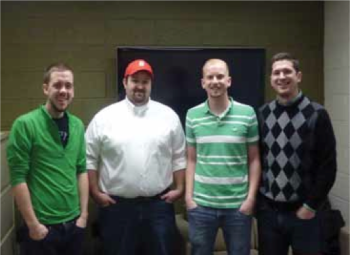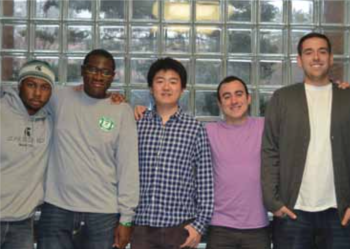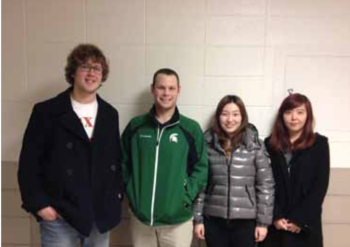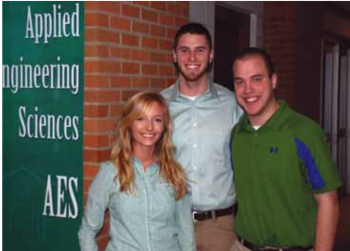Applied Engineering
Projects
We gratefully acknowledge Jim Manely and the Demmer Center for Business Transformation at Michigan State University for their guidance and assistance with our projects. We gratefully acknowledge Judy S. Jacobs, Director, Corporate & Student Relations Office, Michigan State University, Department of Supply Chain Management for her assistance in securing projects.
For information on becoming a project sponsor, please contact Dr. Laura Genik.
The Applied Engineering Sciences Capstone class is held in Spring Term only. The following were the project sponsors and projects for the Spring of 2013:
Bath Township: Revamping the Main Intersection
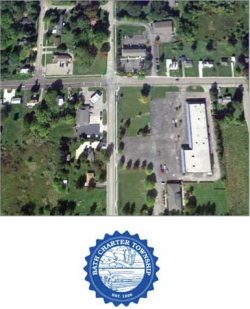 The purpose of our project is to help Bath Township rebrand itself by giving them the tools needed to initiate and sustain new business development.
The purpose of our project is to help Bath Township rebrand itself by giving them the tools needed to initiate and sustain new business development.
Bath Township is a small community but growing fast. Since the 2006 census, the population has increased by 54% to the 2010 total of 11,558 residents. To help accommodate the growing number of citizens, the township leadership has taken it upon themselves to invest time and money into the common conveniences that the township has to offer.
Our team will help in this process by addressing four main areas: understanding business site requirements, increasing availability of statistical data, cultivation of a sense of community and the creation of relationships with local entrepreneurs.
Specifically, our group has focused our efforts on the revamping of the intersection ofWebster and Clark. This area serves as the main intersection of Bath Township and will serve as a starting point for future development.
For reference, Bath Township is located approximately 15 miles northeast of Lansing, Michigan. Downtown Bath is approximately two miles north of I-69, making it fast and easy to access the freeway for work and shopping.
Habitat for Humanity: Logistics Shipping Solution for E-Paint
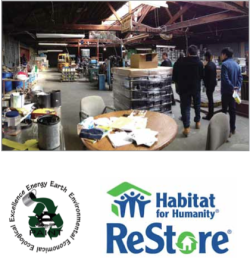 Habitat For Humanity is looking to increase their supply of remanufactured paint, as well as use their ReStores as drop off locations. ReStores are located throughout the state of Michigan. These ReStores sell gently used building materials, furniture, accessories, home improvement goods, and appliances. Remanufactured paint is one of the largest draws of these ReStores.
Habitat For Humanity is looking to increase their supply of remanufactured paint, as well as use their ReStores as drop off locations. ReStores are located throughout the state of Michigan. These ReStores sell gently used building materials, furniture, accessories, home improvement goods, and appliances. Remanufactured paint is one of the largest draws of these ReStores.
The paint is currently collected via donation drives and are then remanufactured by Mr. Jim Cosby at E-Paint (pictured right) in Battle Creek Michigan. E-Paint is the only producer of remanufactured paint in the area and their only customer is Habitat For Humanity
Currently E-Paint has no formal logistics plan or supply chain in place. This is currently preventing paint to be transported to the ReStore locations in order to meet their demand for remanufactured paints.
Objectives
- Increase sales of E-Paint in Habitat ReStores
- Optimize transportation routes
- Increase truck capacity utilization
- Create collection points for donated paint
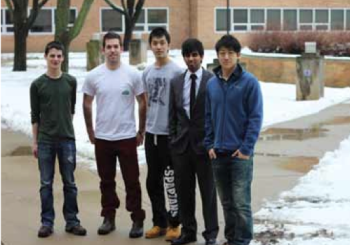
Team Members: Michael Gross, Geno Battista, David Chen, Ali Hasnain, Le Wang, Project Mentor: Luke Balcerzak
MSU Office of Sustainability: MSU Sustainable Purchasing Policy
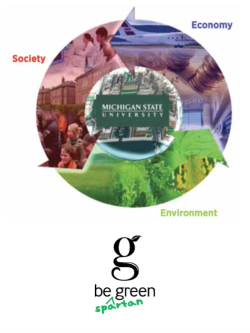 Michigan State University has been known to be one of the most self sustaining universities when it comes to energy use, such as water and electrical. The misunderstanding is where the school buys everyday products such as paper and electrical items used in labs and classrooms.
Michigan State University has been known to be one of the most self sustaining universities when it comes to energy use, such as water and electrical. The misunderstanding is where the school buys everyday products such as paper and electrical items used in labs and classrooms.
The best way to help make sure how sustainable our products are is to create a sustainable purchasing policy. This is our main goal as a group.
A sustainable purchasing policy means buying products that are energy efficient, reduce waste, and reduce cost over time. Having a sustainable purchasing policy also means buying locally. This can in turn form bonds with local companies. Even further down the line help the local economy. Finally, hopefully, forcing these companies to make more sustainable products and services.
The plan on obtaining a policy for MSU is to look at other schools that already have a sustainable purchasing policy. Some examples are Rutgers and Arizona State University, who are some of the first to establish a policy.
After researching how other schools policies work and how great the positives are, we will try to adopt some of their policies as well as modify and create some of our own.
The final goal we plan to achieve is to reduce the schools overall ecological footprint when it comes to the purchases it makes.
BioPlastic Polymers & Composites: More Profitable Utilization of Soybeans
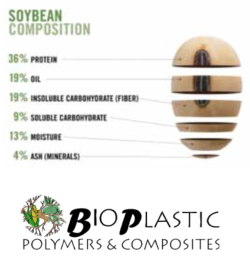 BioPlastic Polymers and Composites is a technology catalyst for innovative development of non-petroleum-based plastics and polymer composites. Headed by CEO Prof. Ramani Narayan (ChE Professor, MSU), the company is a technology catalyst for developing and commercializing technologies in the bioplastics and byproducts space. A major goal of BioPlastic Polymers and Composites is to bring technology partnerships to investment grade; i.e. to de-risk the technology.
BioPlastic Polymers and Composites is a technology catalyst for innovative development of non-petroleum-based plastics and polymer composites. Headed by CEO Prof. Ramani Narayan (ChE Professor, MSU), the company is a technology catalyst for developing and commercializing technologies in the bioplastics and byproducts space. A major goal of BioPlastic Polymers and Composites is to bring technology partnerships to investment grade; i.e. to de-risk the technology.
Zeeland Biobased Products LLC is a joint venture between Bio Plastics & Polymers and Zeeland Farm Services. The goal of this venture is to create and commercialize a portfolio of value added industrial products from the underutilized portions of soybeans and other plants.
Zeeland Farm Services is a privately owned soybean refinery plant that processes about 31,000 bushels of soybeans per day to produce two main products, soybean meal and oil. Zeeland Farm Services soybeans come mostly from Michigan farmers, with 90% of Michigan grown soybeans processed here and over 2,500 farmers serviced.
The goal of our project is to investigate the possibilities of using the meal created from Zeeland Farm Services’ soybean refinery to create value added products. Currently, Zeeland Farm Services sells the meal as feed for animals, which has a low price per pound. After the product analysis is done, we will perform extensive and comprehensive analysis of the market to determine the likelihood that our product suggestions will succeed and that there our actual customers in the Michigan area that will buy the products. The ultimate goal is to increase the revenue and profitability of Zeeland Farm Services as well as increase the impact of soybean production on the economy of Michigan.
XG Sciences: Applications of Graphene Nanoplatelets in CDI
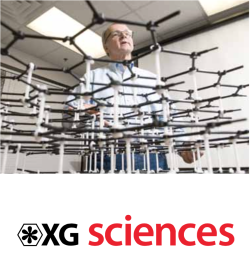 XG Sciences Inc. is a privately owned company, founded in 2006, based out of Lansing, MI. The pilot production facility produces large amounts of material, termed xGnP Graphene Nanoplatelets, using a unique manufacturing process that was pioneered by our team sponsor, Dr. Larry Drzal, at Michigan State University. These exceptionally thin xGnP Graphene Nanoplatelets act as barriers and excellent electrical and thermal conductors. By 2010, XG Sciences achieved their first goal and released their first line of nanoplatelets called Grade H as a commercial product. Today, the company has a global presence in Korea, Japan, Taiwan, China, and Europe.
XG Sciences Inc. is a privately owned company, founded in 2006, based out of Lansing, MI. The pilot production facility produces large amounts of material, termed xGnP Graphene Nanoplatelets, using a unique manufacturing process that was pioneered by our team sponsor, Dr. Larry Drzal, at Michigan State University. These exceptionally thin xGnP Graphene Nanoplatelets act as barriers and excellent electrical and thermal conductors. By 2010, XG Sciences achieved their first goal and released their first line of nanoplatelets called Grade H as a commercial product. Today, the company has a global presence in Korea, Japan, Taiwan, China, and Europe.
By conducting market analysis and implementing business strategies, Team XG Sciences will provide a comprehensive overview analyzing the affects of nanoplatelets on the water purification market. Our team will research current methods of desalinization, identify opportunities and weaknesses in the market, and isolate the parameters necessary to making xGnP Graphene Nanoplatelets into a viable business.
Through the research process, our team is able to complete a market and business analysis as well as have an impact on the severe water crisis throughout the world. XG Sciences is on the cutting edge of technology with the aspirations of producing a nanoplatelet that is just as successful as our everyday copper and plastic. Our hope is to help XG Sciences accomplish this goal in order to eventually help others around the globe.
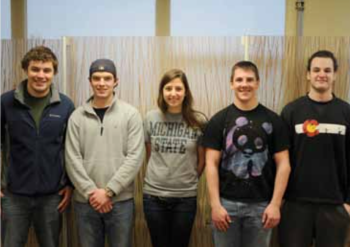
Team Members: Brett Callihan, Ryan Redwood, Megan Chorazyczewski, Norm Freda, Matt Grubba, Project Mentor: Kevin Gibbons
Consumers Energy: Procurement Sustainability
 Consumers Energy provides electric and gas energy to more than six million of Michigan’s residents. They have over 3,500 suppliers providing a wide range of products and services to assist Consumers in providing top quality for its customers.
Consumers Energy provides electric and gas energy to more than six million of Michigan’s residents. They have over 3,500 suppliers providing a wide range of products and services to assist Consumers in providing top quality for its customers.
Currently, Consumers is in the midst of incorporating sustainability into all levels of the company. To this end, the supply chain department at Consumers wants to develop a comprehensive procurement sustainability policy. To accomplish this, Consumers’ suppliers need to be studied, graded and monitored for compliance to various environmental standards. This is where our work comes in. Our goal is to develop a policy for Consumers that grades its suppliers and then applies that grade to a tiered supplier recognition system.
To develop this policy, it will entail assessing Consumers’ current supply base based on sustainability programs and certifications already in place, investigating industry alliances and competitors green programs, and establishing best practices for sustainability across multiple industries.
Once this has been done, recommendations will be given for monitoring and tracking key sustainability metrics and the amount of staff and cost it will take to implement this program.
This project will help Consumers support a clean environment, build upon their sustainable energy policy, support a solid economy, and continue to stress the importance of sustainability to Consumers’ target market.
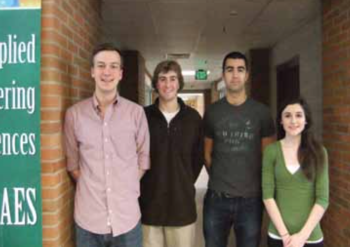
Team Members: Michael Spreng, Jared Kavinsky, James Wolf, Emily Smith, Project Mentor: Kevin Gibbons
Chrysler-Prototype: Parts Receiving Process Improvement
 Chrysler Group LLC, in strategic alliance with Fiat S.p.A., is a world-class automobile manufacturing company, providing a total of seven different brands across a worldwide distribution network. Founded in 1925 by Walter P. Chrysler, the company has grown to offer some of the world’s most identifiable vehicles, including the Chrysler 300 and Town & Country, Jeep Wrangler and Grand Cherokee SRT, Ram 1500, and the all- new Dodge Dart. With its headquarters in Auburn Hills, Mich., Chrysler employs over 71,000 professionals, and was able to produce 2.2 million vehicles worldwide, yielding a net revenue of $65.8 Billion in 2012.
Chrysler Group LLC, in strategic alliance with Fiat S.p.A., is a world-class automobile manufacturing company, providing a total of seven different brands across a worldwide distribution network. Founded in 1925 by Walter P. Chrysler, the company has grown to offer some of the world’s most identifiable vehicles, including the Chrysler 300 and Town & Country, Jeep Wrangler and Grand Cherokee SRT, Ram 1500, and the all- new Dodge Dart. With its headquarters in Auburn Hills, Mich., Chrysler employs over 71,000 professionals, and was able to produce 2.2 million vehicles worldwide, yielding a net revenue of $65.8 Billion in 2012.
On a daily basis, Chrysler receives and handles an immense amount of inventory from numerous suppliers for use in their Prototype Build Engineering Department. This process affects many different functional areas, and it is essential that information associated with inventory shipments be accounted for immediately into their ERP systems. Chrysler’s current process requires employees to “manually receive” about half of these shipments annually, due to improper labeling issues on the behalf of their suppliers. Our goal is to improve the efficiency and data collection associated with Chrysler’s receiving process. Achieving this goal will require us to develop barcode labels capable of meeting the informational needs of all affected functional areas, as well as provide detailed labeling instructions for suppliers. Furthermore, we will research modern barcode scanning technology and suggest our findings to the Prototype Build Engineering team
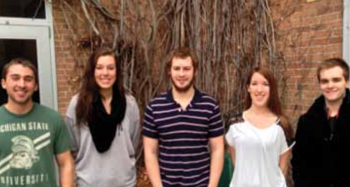
Team Members: Adam Altier, Chelsea Davis, Aaron Day, Abigail Henry, Eric Vincent, Project Mentor: Lucas Balcerzak
Peckham Incorporated: Manufacturing Process Improvement
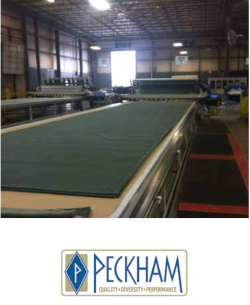 Peckham Incorporated is a unique business and human services agency whose mission is to provide a wide range of opportunities to maximize human potential. The agency’s headquarters in Lansing, Michigan is consulting a team of AES student to help optimize one of their fabric handling processes.
Peckham Incorporated is a unique business and human services agency whose mission is to provide a wide range of opportunities to maximize human potential. The agency’s headquarters in Lansing, Michigan is consulting a team of AES student to help optimize one of their fabric handling processes.
After receiving rolls of material for a dedicated supplier, Peckham Inc uses a series of spreaders to unroll each type of fabric in preparation for a cutting and sewing process. However, each supplied roll of fabric has a varying degree of width both between multiple rolls and between the endpoint of the same roll. This variance causes problems in the production process when workers forcibly stretched the fabric to conform to the operating standards set by the plant. While placed in the spreader, the stretched material reverts back to its original shape. Consequently, the layers of fabric become skewed and are improperly cut. These defective sections are then sewn together and shipped to another production facility where they go undetected until they are needed.
To assist Peckham, our team wants to better accommodate for the great variance in the supplied fabric. Through process optimization, we hope to assist Peckham in reducing the amount of defective fabric sections the line produces. This reduction of defective sections would ideally cut processing cost and thus improve Peckham’s bottom line.
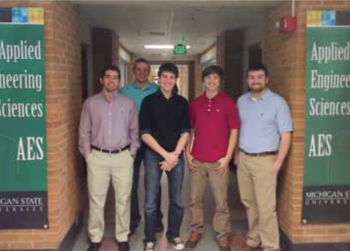
Team Members: Nate De Bruin, Ryan Bosma, Gordon Gibbons, Jay Zaleski, Nick Wasko, Project Mentor: Lucas Balcerzak
Schafer Hardwood Flooring Co.: Developing Lean Systems Processes
 Schafer Hardwood Flooring Co. in Tecumseh, MI provided the opportunity to use the core of the Applied Engineering Science curriculum in a practical, real-world situation. While completing this project we were not only able to use the knowledge we had gained to help serve Schafer Hardwood Flooring but also the surrounding community.
Schafer Hardwood Flooring Co. in Tecumseh, MI provided the opportunity to use the core of the Applied Engineering Science curriculum in a practical, real-world situation. While completing this project we were not only able to use the knowledge we had gained to help serve Schafer Hardwood Flooring but also the surrounding community.
The main goal while working at Schafer was to help them introduce lean practices into both their overall business model and throughout their supply chain. The project focused on trying to root out the inefficiencies in both the ordering and scheduling processes. These inefficiencies were seen as the main barrier holding the company back from realizing its outstanding growth potentialn order to do so, both the order and schedule process needed to be both significantly simplified as well as standardized; thus making the processes as a whole much leaner. This in turn should lead the reduction of lead time as well as an increase in the speed and accuracy of quotes and orders. Lastly the goal was to make this whole process sustainable so that it will benefit Schafer both now and well into the future.
To achieve these goals a new automated customer order form and scheduling system was put in place. The entire Schafer team was trained on the processes and ample time and effort was put into making the transition as smooth as possible.
